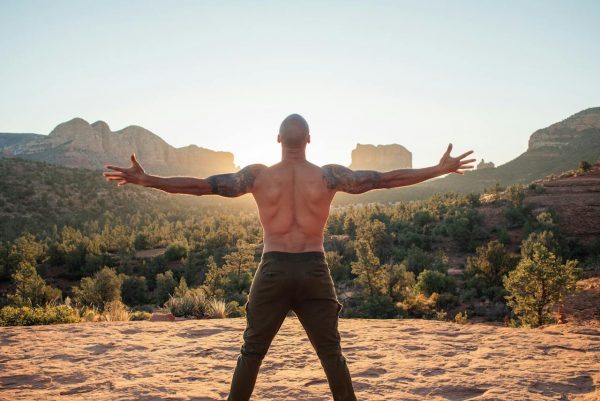‘Bodied’ is a word used a lot to disguise casual bigotry. That is, ‘male-bodied’ and ‘female-bodied.’ As dominant discourse changes, these terms are fading, albeit slowly, from Queer communities as we learn or adopt different rhetoric to make our lexicon and movements more inclusive of everybody’s bodies. Our consciousness is raised, and we, as communities–and as members of those communities–evolve. For example, ten years ago, the term ‘Cisgender’ didn’t exist; five years ago, it certainly existed, but it wasn’t integrated into the mainstream Queer lexicon. Despite people still debating the use of the term (cisgender people like to view it as a slur for some strange reason), it’s widely accepted within dominant sub-cultures, and working its way into the mainstream dominant culture.
Still, we grapple to find words to describe our bodies–trans bodies. ‘Male-‘ and ‘female-bodied’ have been floating around the internet as preferred terms for a while, to indicate the difference between gender and sex; the argument is that gender is not a binary, and at this point, it’s common knowledge–well, closer to common knowledge, at least. People are starting to grasp what “gender is not binary” means. What a majority of people in the mainstream, and even in some Queer sub-cultures, don’t understand is that sex is not binary either. So, inevitably, as language evolves, the once considered (so-called) politically correct terms ‘male-‘ and ‘female-bodied’ are being analyzed with more critical thought. The awesome intersectional feminism hot-spot, Everyday Feminism, recently announced in a Facebook post that they would be eliminating the terms ‘male-‘ and ‘female-bodied’ from posts because it reinforces oppressive notions, and contributes to Intersex erasure. (A couple of examples as to what this means: a trans man is not ‘female-bodied’ because, if he identifies as male, his body is also male regardless of genitalia. If a woman happens to have a penis, it’s a woman’s penis. Bodies of individuals who are non-binary have non-binary bodies by default.) AFAB and AMAB are also popular alternatives, but those also point to genitalia as what defines female and male. Moreover, they erase Intersex bodies and people.
Working towards finding terms to describe our bodies is an important undertaking. Language is a very fluid thing, preferred terms can and do change over time and as Queer movements evolve. No term will ever be the perfect term. A struggle that pops up every time queer rhetoric evolves is incorporating it into the dominant culture and mainstream language. (Not that media outlets can ever be trusted to use Queer terminology without mocking it–a large part of the mockery is how often terminology evolves: gee, can’t we just make up our minds already?) ‘Male-‘ and ‘female-bodied’ have only recently bloomed their way into dominant rhetoric; it was a frustratingly difficult struggle riddled with innumerable obstacles to get there. It will be a frustratingly difficult struggle riddled with innumerable obstacles to remove it from mainstream use in order to incorporate a better, more accurate description.
That may take a while.
One example of how this sort of oppressive language can actually be quite harmful when used by media-promoted figures largely visible in the public eye is a recent statement by professional MMA badass Ronda Rousey. Rousey made statements regarding fellow professional MMA badass Fallon Fox. It has, of course, Broke The Internet (as the cool kiddos say), sparking Facebook and Twitter rants left and right, arguing for both sides.
Rousey’s statement was more than just a verbal statement. It was a political statement, whether it was intended to be or not. When Ronda Rousey busted into the UFC, she made female athletes in male-dominated sports visible; shattered a glass ceiling that gave thousands of young girls and women a figurehead of progress–that they, too, need not be forever relegated to field hockey over football. She made a huge political statement in challenging notorious spousal abuser, Floyd Mayweather, to a professional fight with the intent to turn the tables. (To make him see how it feels to be beaten by a girl for once instead of the other way around–a bold and necessary sentiment, yet one riddled with internalized misogyny nonetheless.) She also made a huge political statement when she refused to go up against Fallon Fox in a scheduled professional fight on the basis that Fox is a trans woman. Rousey cites Fox’s ‘male body’ as her reason, with Dana White, the owner of UFC backing, up the statement with his opinion that it would “not be [a] fair fight.”
Rousey claimed that because Fox is ‘male-bodied,’ her bone structure is inherently superior (false), her bone density is inherently superior (false), her upper-body strength is inherently superior (false), and so on. Dana White, again, backed up these notions.
Fox, who came out in 2013 as transgender, is said by Dana White, Ronda Rousey, and countless opinionated people using the Internet, to have an advantage over any other female fighter by default. Fallon Fox is assigned a body, told who and what she is, by everyone else besides her. (It should be noted that is not just trans individuals this kind of expression impacts; intersex folks are oppressed using similar tactics, contributing to the unique forms of erasure they must face.)
Every media outlet covering Rousey’s statement cites superior muscle mass, much of which is contained in the upper-body. Fox, however, is on Hormone Replacement Therapy (HRT) as part of her individual journey in transitioning. HRT involves estrogen and progestogen, hormones that are predominant in (so-called) ‘female-bodied’ individuals; it also involves what are known as “anti-androgens,” that work to block hormones that are predominant in (so-called) ‘male-bodied’ individuals. Regimens of HRT result in re-distribution of muscle mass, including muscle mass contained in the upper-body. It could be argued Fox is at a disadvantage while undergoing HRT therapy because her upper-body is currently being re-distributed–which isn’t to say Fox isn’t a super badass; she certainly is. (Especially considering that she is continuing to fight professionally while potentially at a disadvantage. Fallon Fox is a badass, no ifs, ands, or buts.) Now, body mass–in this case muscles–is something that takes time to accumulate. It doesn’t ‘just happen.’ Ronda Rousey needed to work hard for her muscular body, as does any athlete regardless of gender or sex. Fallon Fox had to work hard for her muscular body as well, as does any athlete, regardless of gender or sex. Neither years of continuous back-busting, muscle-sculpting, body-building work, nor her successful fighting career, should, under no circumstances, be dismissed because of the straw-man quality argument based only on the fact that she has the term ‘trans’ in front of the words ‘woman athlete.’
Rousey shattered the glass ceiling of women’s MMA fighting. However, she does not get to decide which women also get to climb through triumphantly and which women are barred from this progression. The cracks made in glass ceilings are for everyone, no exceptions –and trans women are women: no exceptions. Rousey has since recanted her transphobic sentiments on several media platforms. She now claims that she “would not . . . refuse [or] protest” if she was formally put up against any women in the ring, Fox included.
I’m glad Ronda Rousey revoked her transphobic–and Intersex-erasing–statements (whether she did it for PR purposes or actually thought critically about what she said and realized the ways in which her actions were problematic). Really, I am. Yet lasting damage has been done. Thousands of young girls and women look to Ronda Rousey as a figurehead of possibilities, as validation and living proof of their own abilities. People of all ages and gender identities become enraptured by their cultural, and personal, heroes. It’s not just about backpedaling on casual bigotry, rather the fact that cultural icons have a special kind of impact on us. Our role models need to be aware of how wildly important they are; what they say and do matters, and, moreover, is listened to. Their impact can either be detrimental or utilized as a tool to nurture the next generation of open hearts and minds.
I hope Ronda Rousey chooses the latter option.





